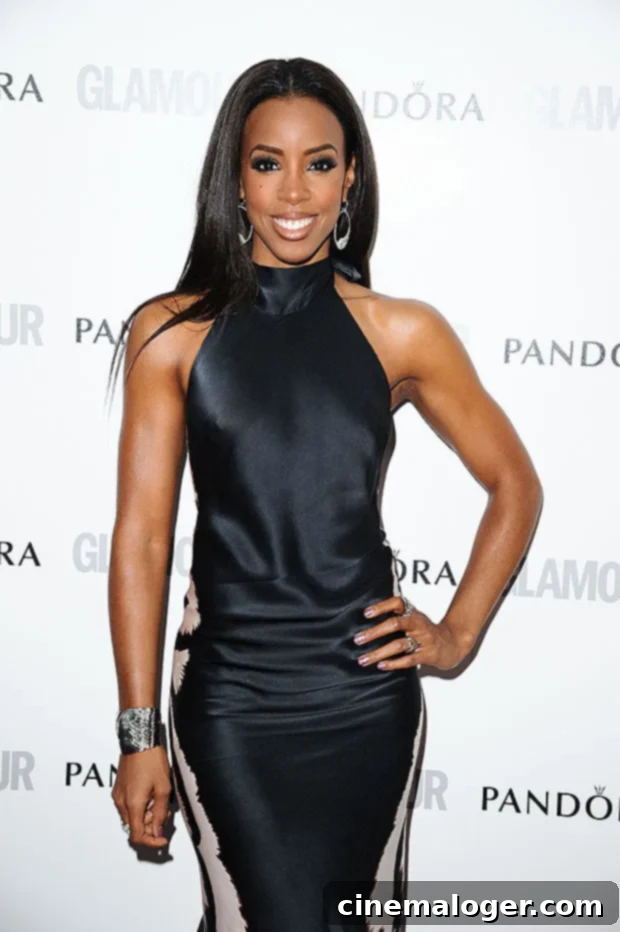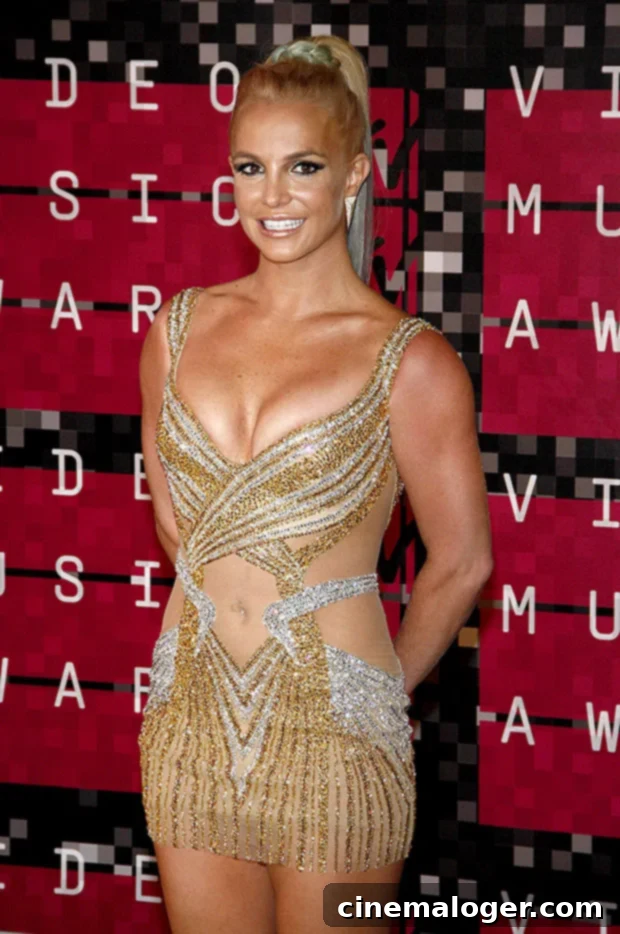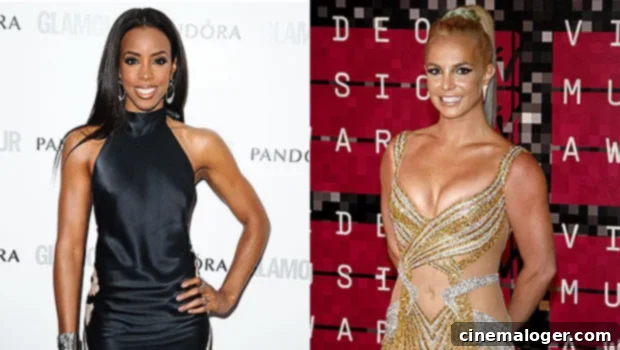Kelly Rowland’s Principled Stance: Why She Hasn’t Watched the Britney Spears Documentary
In an era where celebrity documentaries often dominate headlines, former Destiny’s Child member Kelly Rowland has taken a distinct stance regarding the much-discussed FX/Hulu documentaryFraming Britney Spears. While many, including fellow celebrities and fans, have eagerly consumed the film detailing the controversial life and conservatorship of pop icon Britney Spears, Rowland has consciously chosen not to watch it. Her reasoning stems from a deeply held respect for artists’ privacy and the authenticity of their own narratives, a perspective shaped by her own experiences rising to fame alongside Spears in the late ’90s.
The parallel trajectories of these two stars are striking. Both Kelly, 40, and Britney, 42, soared to global recognition as teenagers during a pivotal time in pop music. While Kelly found immense success as a member of Destiny’s Child with Beyoncé and Michelle Williams, Britney captivated the world as a solo phenomenon. Despite this shared history within a demanding industry, Kelly’s decision not to engage with the documentary underscores a critical discussion about media ethics and celebrity autonomy. She recently revealed her rationale during an appearance on Watch What Happens Live with Andy Cohen on March 4, where she candidly addressed why she’s having a “hard time” wanting to view the film.
Kelly Rowland’s Commitment to Artistic Privacy and Authorized Narratives
During her conversation with Andy Cohen, the topic of the Britney Spears documentary inevitably arose. As a new mom and seasoned industry veteran, Kelly’s response was both thoughtful and firm. “No, I haven’t seen the Britney doc. I’m having a hard time in really wanting to watch it,” she stated. Her reluctance isn’t born of indifference, but rather a profound principle. “Just because I really respect the fact, like, when artists say, ‘This is a documentary. It’s OK to watch it.’ You know what I mean?” This sentiment highlights a crucial distinction: the difference between a documentary created about a public figure and one explicitly endorsed or initiated by them.

Rowland elaborated on her principled stance, explaining, “I respect their space and their privacy and their point of view and their story. What they feel like their story is from their brains, their hearts, their mouths from which they speak. So I kind of respect that.” This statement resonates deeply in an age where public figures’ lives are constantly scrutinized and often interpreted without their direct input. For Kelly, the absence of Britney Spears’ explicit endorsement or participation in Framing Britney Spears makes her hesitant to view it, even as she acknowledged, “But everybody says that they really enjoy it and it’s great.” Her respect for an artist’s personal narrative and autonomy takes precedence over public curiosity, offering a rare glimpse into the ethical considerations many celebrities grapple with concerning their peers’ portrayals.
The Impact of Framing Britney Spears and Garcelle Beauvais’s Perspective
While Kelly Rowland maintains her personal boundary, the documentary has undeniably sparked a widespread public discourse. Her fellow guest on Watch What Happens Live, Garcelle Beauvais, offered a contrasting perspective, having seen the film. The Real Housewives of Beverly Hills star, 57, was visibly moved by the heartbreaking details of Britney’s journey, remarking, “She was such a young girl living in a fishbowl. I felt sorry for her.” Beauvais’s reaction reflects the sentiments of millions who watched the documentary and gained a deeper understanding of the immense pressures and intrusive scrutiny Britney faced from a very young age within the music industry, particularly from the media.

Framing Britney Spears meticulously cataloged instances of such harsh treatment. It prominently featured clips from the infamous 2003 Diane Sawyer interview, where the journalist controversially questioned Britney about what she “did” to ex Justin Timberlake that caused him so much open heartbreak. This particular segment has been widely criticized in retrospect for its misogynistic undertones and its role in unfairly villainizing Britney. The documentary also revisited other troubling media interactions, including a host openly wanting to discuss Britney’s breasts, further illustrating the objectification she endured. Perhaps most vividly, the film highlighted the unsympathetic, circus-like media coverage surrounding her highly publicized 2007 head shaving incident and subsequent mental health breakdown, painting a stark picture of a young woman under immense, unrelenting pressure.
Unpacking the Conservatorship: Britney’s Fight for Freedom
Beyond the media’s role, a central focus of the documentary was the controversial conservatorship Britney Spears was placed under in 2008. This legal arrangement granted her father, Jamie Spears, significant control over her estate, financial affairs, and personal well-being, effectively stripping Britney of her autonomy. The film painstakingly detailed the origins of this conservatorship, presenting a narrative that suggested a system designed to protect her instead became a source of profound control and distress. It brought to light the complexities of the legal battle Britney has since been waging to remove her father completely from any oversight of her life and affairs.
The documentary effectively conveyed the gravity of Britney’s situation, showcasing her continuous efforts in court to regain her independence. Through legal filings and statements, it was revealed that Britney harbored deep fears regarding her father’s involvement. In a significant development in Nov. 2020, her lawyer stated in court that she was “afraid” of her father, a sentiment that resonated powerfully with audiences. Despite this, a Feb. 2021 court hearing saw a judge rule to keep Jamie Spears on as co-conservator of her career and finances, alongside the wealth management firm Bessemer Trust. This decision, though a partial victory for Britney in that it added a corporate co-conservator, still left her fighting for full liberation from an arrangement she deemed oppressive. The ongoing legal struggle became a poignant cornerstone of the documentary, illustrating the challenges faced by individuals seeking to reclaim agency over their own lives under such unique legal circumstances.
The #FreeBritney Movement and Its Growing Celebrity Support
One of the most significant outcomes of Framing Britney Spears has been the widespread amplification and increased understanding of the “Free Britney” movement. This fan-driven campaign, initially a fringe effort, exploded into mainstream consciousness following the documentary’s release. It galvanized public opinion, drawing attention to what many perceive as a gross injustice and a violation of Britney’s fundamental human rights. The documentary provided crucial context and evidence, turning skepticism into empathy and advocacy for millions worldwide.
The film’s impact was not limited to the general public; it also prompted a wave of solidarity from within the celebrity community. Stars such as Miley Cyrus, who has repeatedly chanted “Free Britney!” during her performances, and Kacey Musgraves, who expressed her heartbreak and support, are just two examples of the numerous public figures who have shown their support for Britney. Other prominent voices, including Cher, Paris Hilton, Sarah Jessica Parker, and countless others, have also lent their platforms to the #FreeBritney cause, urging for the termination of her conservatorship. This collective celebrity endorsement not only added significant weight to the movement but also brought unprecedented media attention to the complex legal and personal issues at play, transforming it from a niche fan campaign into a global call for justice and autonomy for the pop star.
The Broader Conversation: Media Ethics and Celebrity Well-being
Kelly Rowland’s decision, while personal, opens up a broader, essential discussion about media ethics, celebrity well-being, and the delicate balance between public interest and individual privacy. In an age of unprecedented access to information and a voracious appetite for celebrity narratives, unauthorized documentaries often serve as catalysts for important conversations. However, Rowland’s stance reminds us that these narratives, while powerful, inherently carry the weight of interpretation and perspective. The absence of the subject’s direct input raises questions about who owns a story, especially when that story is fraught with pain and legal complexities.
Her perspective encourages a pause: Should public interest always override personal boundaries, especially when the subject is not actively participating in the telling of their story? For Kelly, the answer leans towards respecting that boundary, a sentiment perhaps born from her own experiences navigating the intense scrutiny of fame. It highlights a growing awareness within the entertainment industry about the mental health and autonomy of its stars, acknowledging that even the most public lives deserve a measure of control over their personal narratives. Ultimately, while Framing Britney Spears undeniably served a vital role in galvanizing support for Britney, Kelly Rowland’s refusal to watch it stands as a quiet, yet potent, statement on the profound importance of consent, respect, and the right to one’s own truth in the celebrity ecosystem.
